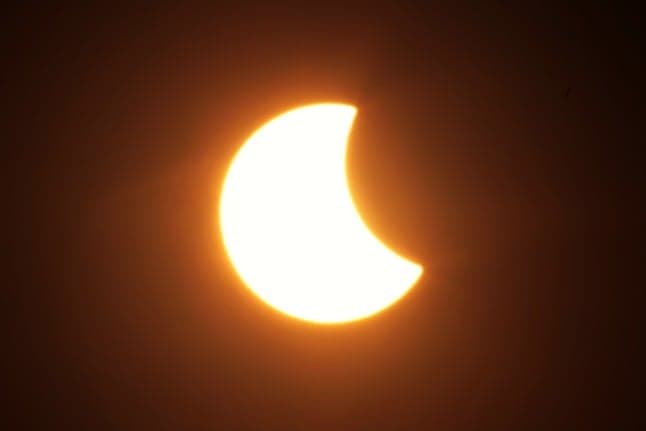Germany to catch glimpse of rare partial solar eclipse on Thursday

For the first time in six years, a partial solar eclipse may be spotted over Germany on Thursday afternoon.
Depending upon the location in Germany, the rare astronomical phenomenon can be best observed between 12:20pm and 12:40pm.
The Stiftung Planetarium Berlin is also broadcasting a livestream of the rare solar event, which occurs when the moon is directly between the sun and earth. The last partial solar eclipse occurred in Germany in March 2015.
The phenomenon looks as if the sun is missing a piece at the top. The more northern the location, the greater the shadow cast on the sun is.
In the far northern cities of Sylt and in Flensburg, about 20 percent of the sun will be covered, in Hamburg about 17 percent, in Hanover 15 percent, and in Neubrandenburg 13 percent.
In southern Germany, it's only about six percent.
As reported by the German Weather Service (DWD), the climate during the eclipse will also largely play along: outside of stormy weather in the Alps and low mountain ranges, most of Germany will be cloud-free and sunny on Thursday.
How to view a solar eclipse
Anyone who wants to observe the solar eclipse should under no circumstances look into the sun with the naked eye, but rather use protective glasses.
An unprotected look can lead to visual disturbances, explained Christian Karl Brinkmann, chief physician of the eye clinic in Neubrandenburg. Special solar eclipse glasses are available, for example, in planetariums and from opticians.
Normal sunglasses or a CD held in front of the eye are not sufficient.
If you want to be on the safe side, you can follow the natural spectacle in a livestream - for example on the websites of the Hamburg Planetarium, the Kiel University of Applied Sciences Observatory or the Berlin Planetarium.
There are a maximum of two to four solar eclipses per year somewhere on earth. The next one to be viewed in Germany will be on October 25th, 2022. The last took place in Argentina in December.
The German Association of Star Friends (Vereinigung der Sternfreunde) want to distribute photos of the solar eclipse on June 10th under the hashtag #sofi2021 over social media.
Vocabulary
Partial solar eclipse - (die) partielle Sonnenfinsternis
sight/vision - (das) Sehvermögen
Equipment - (die) Ausrüstung
Safety glasses/goggles - (die) Schutzbrille
We’re aiming to help our readers improve their German by translating vocabulary from some of our news stories. Did you find this article useful? Let us know.
Comments
See Also
Depending upon the location in Germany, the rare astronomical phenomenon can be best observed between 12:20pm and 12:40pm.
The Stiftung Planetarium Berlin is also broadcasting a livestream of the rare solar event, which occurs when the moon is directly between the sun and earth. The last partial solar eclipse occurred in Germany in March 2015.
The phenomenon looks as if the sun is missing a piece at the top. The more northern the location, the greater the shadow cast on the sun is.
In the far northern cities of Sylt and in Flensburg, about 20 percent of the sun will be covered, in Hamburg about 17 percent, in Hanover 15 percent, and in Neubrandenburg 13 percent.
In southern Germany, it's only about six percent.
As reported by the German Weather Service (DWD), the climate during the eclipse will also largely play along: outside of stormy weather in the Alps and low mountain ranges, most of Germany will be cloud-free and sunny on Thursday.
How to view a solar eclipse
Anyone who wants to observe the solar eclipse should under no circumstances look into the sun with the naked eye, but rather use protective glasses.
An unprotected look can lead to visual disturbances, explained Christian Karl Brinkmann, chief physician of the eye clinic in Neubrandenburg. Special solar eclipse glasses are available, for example, in planetariums and from opticians.
Normal sunglasses or a CD held in front of the eye are not sufficient.
If you want to be on the safe side, you can follow the natural spectacle in a livestream - for example on the websites of the Hamburg Planetarium, the Kiel University of Applied Sciences Observatory or the Berlin Planetarium.
There are a maximum of two to four solar eclipses per year somewhere on earth. The next one to be viewed in Germany will be on October 25th, 2022. The last took place in Argentina in December.
The German Association of Star Friends (Vereinigung der Sternfreunde) want to distribute photos of the solar eclipse on June 10th under the hashtag #sofi2021 over social media.
Vocabulary
Partial solar eclipse - (die) partielle Sonnenfinsternis
sight/vision - (das) Sehvermögen
Equipment - (die) Ausrüstung
Safety glasses/goggles - (die) Schutzbrille
We’re aiming to help our readers improve their German by translating vocabulary from some of our news stories. Did you find this article useful? Let us know.
Join the conversation in our comments section below. Share your own views and experience and if you have a question or suggestion for our journalists then email us at [email protected].
Please keep comments civil, constructive and on topic – and make sure to read our terms of use before getting involved.
Please log in here to leave a comment.